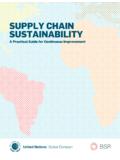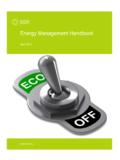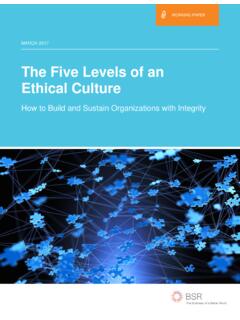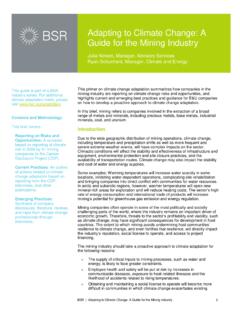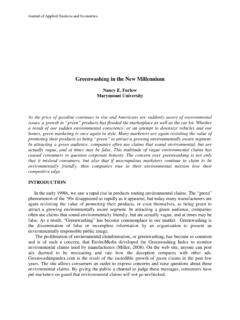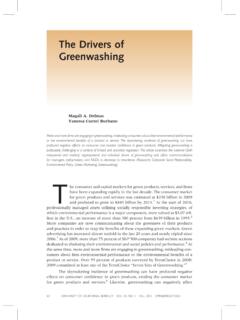Transcription of Understanding and Preventing Greenwash: A Business Guide
1 Understanding and Preventing Greenwash: A Business GuideRina Horiuchi and Ryan Schuchard, BSRLucy Shea and Solitaire Townsend, Futerra July 2 About this ReportThis report was led by Rina Horiuchi (BSR), Ryan Schuchard (BSR), Lucy Shea (Futerra) and Solitaire Townsend (Futerra), with support from Stephanie Corrado (Futerra), L a Crouzat (Futerra), Lulu Kitololo (Futerra), Emilee Pierce (Futerra), Natalya Sverjensky (Futerra), Laura Clise (BSR) and Emma Jackson (Futerra).Interviewees include Glenn Prickett (Center for Environmental Leadership in Business ), Lisa Manley (Coca-Cola), Sean Donahue (Dell), Mark Newton (Dell), Victoria Mills (EDF), Mike Trainor (Intel), Kevin Lauren Orme (Marks & Spencer), Brian Kramer (McDonald s), Louise Marcotte (McDonald s), Hagen (REI), Kevin Myette (REI), Eliot Metzger (WRI), Claudia Malley (National Geographic), Marc Rosenberg (Washington Post), and David Mallen (National Advertising Division).DisclaimerBSR publishes occasional papers as a contribution to the Understanding of the role of Business in society and the trends related to corporate social responsibility and responsible Business practices.
2 BSR maintains a policy of not acting as a representative of its membership, nor does it endorse specific policies or standards. The views expressed in this publication are those of its authors and do not reflect those of BSR members. About BSRA leader in corporate responsibility since 1992, BSR works with its global network of more than 250 member companies to develop sustainable Business strategies and solutions through consulting, research, and cross-sector collaboration. With six offices in Asia, Europe, and North America, BSR uses its expertise in the environment, human rights, economic development, and governance and accountability to Guide global companies toward creating a just and sustainable world. Visit for more FuterraFuterra is the award winning global communications agency. We have bright ideas, we captivate audiences, build energetic websites one day and grab opinion formers attention the next. But the real difference is that Futerra has only ever worked on corporate responsibility.
3 From Microsoft to Newscorp, Royal Dutch Shell to Greenpeace, the United Nations to Ben and Jerry s, Futerra has built a unique expertise in corporate responsibility and communicating sustainability. We are committed to world class learning in this field; visit for our other is Greenwash? Greenwash is Bad for BusinessDefining GreenwashWhy is Greenwash Growing?Stakeholder PerspectivesWhat do Stakeholders Think?Stakeholder Perspectives: CustomersStakeholder Perspectives: Enforcers Stakeholder Perspectives: Activist NGOsStakeholder Perspectives: Media Guide for Preventing Greenwash A Framework: Impact, Alignment, Communication Check: Are You on the Right Path? Navigating DilemmasExample PracticesWays ForwardEnd Notes 236911121417192225262831343738 Contents2 What is Greenwash? Greenwash is Bad for Business Defining Greenwash Why is Greenwash Growing?3Do you trust Business ?If you answered yes, consider yourself unusual. According to a 2009 Edelman study of more than 20 countries, global trust in Business is at an all-time low and diminishing, with people less trustful of all sources of information about The Edelman Trust Barometer, an output of this research, shows trust in advertising is down to 13 percent from 30 percent, and trust in company websites is down to 21 percent from 30 is Bad for BusinessParadoxically, other studies show that demand for environmentally low-impact products remains high.
4 The 2009 Cone Environmental Survey, for example, found that attitudes toward environmentally responsible products remain strong despite a weak So, people want products that they believe are better for the environment, but they are skeptical of messages when they come in the first person. From a Business standpoint, demand for environmentally sensitive products is growing, but communicating accurately and credibly is becoming more top of this conundrum, the consequences of getting it wrong and being seen as purporting a fraud or, greenwashing, a term now in the lexicon of most industries are growing. Whether real or perceived, when consumers see greenwashing, they are likely to punish companies with less sales. When NGOs see it, they are motivated to drive negative campaigns and press. And when regulators see it, they can determine that an environmental claim is a deceptive practice and fine problem should be a concern to all companies, because even if your company is not singled out, greenwashing by your competitors hurts your industry.
5 The more companies are seen as greenwashing, the less likely customers are to trust environmental-related claims in general, and the more likely regulators are to step in and impose , greenwash is a barrier to developing a sustainable economy. It can slow down sustainability efforts by making more people skeptical of environmental initiatives. Greenwash also impedes consumers from Understanding the impacts of their purchasing decisions as they struggle to differentiate between valid and invalid claims. Fighting greenwash uses time and resources that could be better spent on initiatives with positive environmental impacts. 4 Misguided GreenwashThis category includes companies that have made substantial efforts to improve the environmental performance of their products and processes but are unable to communicate these efforts effectively. These companies may be making sweeping generalizations in their claims to try to sound environmentally friendly, or they may be using language that turns off potential customers.
6 They have the potential to move towards the Effective Environmental Communications quadrant by focusing their messages accurately on key impacts backed up with GreenwashAt first glance, these companies seem to be doing commendable work and providing data to back up their claim. However, a deeper dive shows that the company does not deserve as much credit as it seems. It may be lobbying against the very environmental policies it claims to uphold, or it may be putting more resources into its communications than its actual initiatives. False efforts will eventually be uncovered as the public becomes more educated and sensitive to greenwash, and it is only a matter of time that these companies will be sent to the Greenwash Noise NoiseIn cases where a company says, we re green , but does not have much to back up this claim, these messages are not compelling to consumers. Much work needs to be done to move these companies to the top right quadrant, but it is feasible.
7 By assessing the company s impacts throughout the value chain, developing and implementing an environmental strategy, and then communicating these efforts accurately, these companies can create a path to the Effective Environmental Communications of GreenwashSome companies proactively invest in environmentally conscious action, while others focus on claims. One way to visualize this through the matrix Environmental CommunicationsKeep it going this is where we want all Business to claims lack credibiliy, and your brand is at There are better ways to communicate your strong to the EnvironmentEffectiveness of CommunicationsGreenwash NoiseYour communications aren t helping anyone not even your Environmental CommunicationsThis is the goal we have for all companies. These businesses are improving the environmental and social performance of their products and aligning these efforts throughout various functions within the company.
8 They are able to communicate their efforts so that consumers clearly understand the impacts and other businesses look to these companies for leadership. This Guide is designed for companies to better understand where they fall in this matrix and how to get to the top right quadrant of Effective Environmental Communications. Note that this Guide focuses on environmental initiatives due to the availability of information on these trends, but many of the recommended strategies apply to the broader field of sustainability that emphasizes the well-being of society and the environment as an integrated system. Identifying greenwash is not always straightforward there are shades of green and different groups have different opinions on where the line is drawn. Whatever the type of greenwash, it must be stopped for your Business and for our GreenwashIn this section we look at definitions, signs and forms of disseminated by an organization, etc.
9 , so as to present an environmentally responsible public image; a public image of environmental responsibility promulgated by or for an organization, etc., but perceived as being unfounded or intentionally misleading. Oxford English Dictionary Little green lies. Lincoln Star Journal (04/20/2008)Different groups have different nuanced definitions, but the gist of it is the same. If you re giving the impression that you re doing more for the environment than you really are, that s greenwash. Expected PracticesBy now, it has become mainstream practice to consider the risks associated with greenwash. In Eco-Promising: Communicating the Environmental Credentials of Your Products and Services, BSR outlines eight areas that are becoming expected practices for shaping and delivering claims about product environmental attributes. They are:3 1 Know your products biggest impacts. 2 Be transparent. 3 Bolster your claims with independent verification.
10 4 Avoid making claims in a vacuum. 5 Enable and encourage consumers to act. 6 Understand your customers and target different market segments in different ways. 7 Anticipate game-changing Participate in the rule-making. 7 Spotting the 10 Signs of Greenwash In the Guide to Greenwash, Futerra conducted an analysis of online, print, broadcast, and in-person communication to distill 10 signs of greenwash. The signs are intended to enable consumers to spot it, companies to avoid it, and others to prevent it. 1 Fluffy language Words or terms with no clear meaning ( eco-friendly ).2 green product vs. dirty company Such as efficient lightbulbs made in a factory that pollutes Suggestive pictures green images that indicate a (unjustified) green impact ( flowers blooming from exhaust pipes).4 Irrelevant claims Emphasizing one tiny green attribute when everything else is not Best in class Declaring you are slightly greener than the rest, even if the rest are pretty Just not credible Eco friendly cigarettes, anyone?
